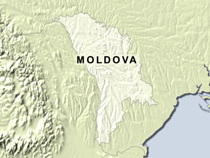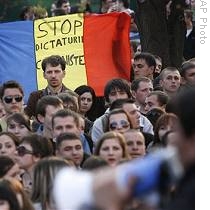News Features Interactive Shows Web Services
|
|
Is Election Crisis in Moldova Part of a Pattern in Post-Soviet Republics?
|
By Judith Latham
Washington
24 April 2009
|
|
 | | Moldova, sandwiched between Romania and Ukraine, emerged as an indepndent republic following the collapse of the Soviet Union in 1991 |
Moldova’s Constitutional Court has upheld the results of a vote recount that confirmed the victory of the ruling Communist Party in the nation’s April 5th parliamentary elections. The recount was initiated by the Communist Party of President Vladimir Voronin. Leaders of the three main opposition parties called the recount a sham and had asked the court to overturn the election results. The recount confirmed the Communist Party won 60 seats in Parliament – one less than needed to nominate a president, but sufficient to form the government. A Moldovan Perspective
 | | Anti-communist demonstrators hold a flag that reads "Stop the Communist Dictatorship" outside the presidential palace in Chisinau, Moldova, 06 Apr 2009 |
The opposition refused to participate in the recount of the vote, insisting instead on checking the electoral lists, according to Moldovan political analyst Vlad Lupan, who has a radio show in the capital city, Chisinau. Speaking on VOA’s International Press Club, Lupan told program host Judith Latham, “The electoral lists contained names of people who had died as well as those who voted multiple times.” “The police arrested even those demonstrators who had protested non-violently and some of them were tortured,” he said. Lupan said the youth are now afraid and that he thinks it unlikely they will demonstrate again.
The majority of Moldova’s 3.8 million people are ethnic Romanian, but there are also sizable minorities of Russian and Ukrainian speakers – as well as the Gagauz, a Turkic group that is Orthodox Christian. “About 10 percent of the country identifies itself with Russia,” he said. He compares the political situation in Moldova with that in Georgia’s breakaway regions of South Ossetia and Abkhazia, where Moscow issued passports to locals as a pretext for an invasion aimed at “protecting” its own citizens.“The dispute over Moldova’s integration with Europe has far more to do with Russia’s claim of a sphere of influence in the former Soviet republics than with concern for Moldova’s Russian minority,” said Lupan. “The problem extends," he says, “to Ukraine and the disputed region of Trans-Dniester.” [Also called Transniestria by ethnic Romanians, Trans-Dniester includes that area between the left bank of the river Dniester and the border with Ukraine.] Trans-Dniester was part of the Moldavian Soviet Socialist Republic before the collapse of the Soviet Union, but declared its independence from the rest of Moldova in 1990. De jure part of the modern Republic of Moldova, Trans-Dniester is a de facto independent state whose political status remains unresolved.
Vlad Lupan describes the government of Moldova today as “authoritarian,” not unlike Russia but “not yet on the level of the dictatorship in Belarus.” “Moldova currently faces critical issues of a geo-strategic and economic nature,” he said. Lupan considers it inevitable that the interests of Russia and the European Union will collide in Moldova, Ukraine, and the former Soviet republics in the Caucasus. “Stability in the Black Sea region, a major transit route for oil, is critical to both the European Union and the United States,” he adds.
Lupan says Washington should clearly state its position against violations of human rights in Moldova. “U.S. opinion carries considerable weight,” he said, “because Moldova needs the economic aid that the United States provides.”
.
Economic Dimension
Also appearing on VOA’s International Press Club, East European analyst Daniel Nelson described President Voronin as “a throwback to the Soviet period during the 1950s.” He called Mr. Voronin “an anti-democrat with no interest in civil society, press freedom, or academic freedom.”
Nelson, a widely respected academic and foreign policy consultant, reminds us that Moldova’s current situation is tied to its post-World War II history. “Moldova was historically part of Romania,” he said, “but because of Romania’s involvement in World War II on the side of Germany, the Soviet Union took Moldova and absorbed it as a Soviet Socialist Republic.” That separation remains today – both physically and politically.
Earlier this month, following the parliamentary elections, President Voronin accused Romania of masterminding anti-communist disturbances and with trying to overthrow his government. In retaliation, he expelled Romania's ambassador and introduced the idea of Moldovan visas for Romanians. Moscow backed his allegation of foreign interference, but Romania, a NATO and EU member, rejected Mr. Voronin's words as a "provocation."
“Neither the European Union nor NATO is making any claim on the territory of Moldova,” Daniel Nelson said. Looking to the future, Nelson said “the best possible outcome – notwithstanding the April 5th elections – would be a stable Moldova that has some elements of prosperity.” Moldova is the poorest country in Europe.
Ethnic Dimension
Joining Lupan and Nelson on the program, Eurasian specialist Paul Goble cited ethnic tensions in post-Soviet Moldova as a reason Moldova has had difficulties in constructing a national identity. The author of many books and articles on the former Soviet Union, Goble suggested the possibility of another round of social uprisings in Moldova, not unlike the upheavals in Georgia and Ukraine in the past few years. “When there have been political problems, brought on by economic or other kinds of crises,” Goble said, “those ethnic divisions resurface.” “What often happens,” he said, “is that the ethnic divisions preclude any effective challenge to the existing political elite.” “Western capitals may think they can ignore what happens in Moldova,” he cautioned, “but in fact the consequences of what happens in Moldova are things that Western capitals cannot ignore.”
Suggested Western Response
Paul Goble suggests the European Union and the United States need to avoid remaining passive. “Make it clear to Moldova’s leaders that electoral violations are unacceptable,” he said. “And tell its neighbors that playing political games [in Moldova and Trans-Dniester] will be dangerous and counterproductive.”
|
|
|